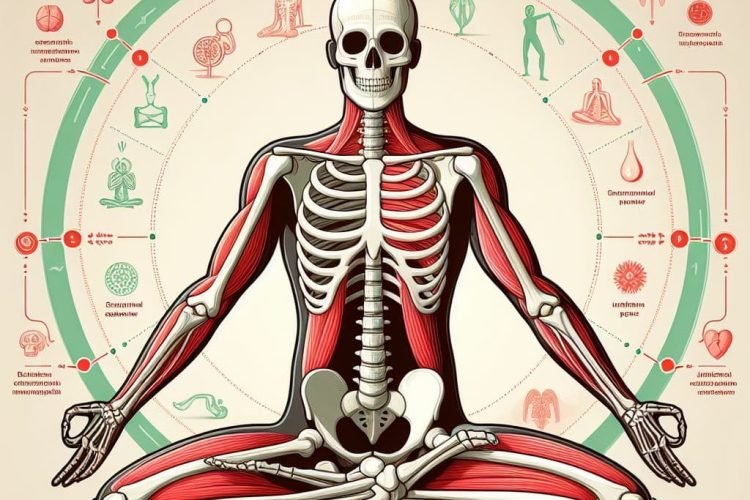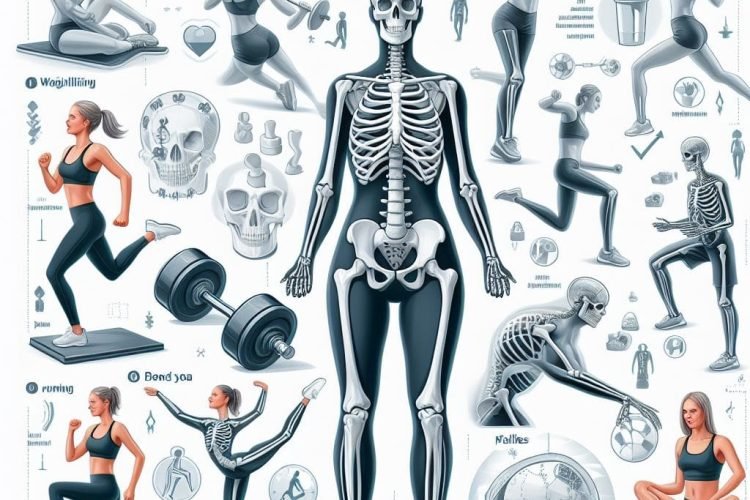Bone health is a crucial aspect of overall well-being that often goes unnoticed until problems arise. Our bones are not just the rigid framework that supports our bodies; they are living tissues that undergo constant remodeling throughout our lives. Understanding the fundamentals of bone health is essential for maintaining mobility, preventing fractures, and promoting overall health and vitality.

The Importance of Bone Health
Bones serve several vital functions in the body beyond providing structural support. They protect our internal organs, produce blood cells in the bone marrow, and store essential minerals like calcium and phosphorus. Maintaining strong and healthy bones is crucial for optimal physical function and quality of life.
Factors Affecting Bone Health
Several factors influence bone health, including genetics, nutrition, physical activity, hormonal balance, and lifestyle choices. While some factors, like genetics, are beyond our control, others, such as diet and exercise, are modifiable and play a significant role in determining bone strength and density.
Role of Nutrition in Bone Health
Good nutrition is crucial for developing and keeping bones strong. Calcium and vitamin D are two nutrients critical for bone health. Calcium is the primary mineral component of bones, providing strength and structure, while vitamin D facilitates calcium absorption and utilization. Incorporating calcium-rich foods such as dairy products, leafy greens, and fortified foods into your diet can help meet your body’s calcium needs. Additionally, spending time outdoors and consuming vitamin D-rich foods like fatty fish, eggs, and fortified cereals can support healthy bones.
The Role of Micronutrients in Bone Health
Micronutrients, including vitamins and minerals, play a crucial role in maintaining optimal bone health. While calcium and vitamin D often steal the spotlight, several other micronutrients are equally important for ensuring the strength and integrity of bones. Here, we delve into the significance of micronutrients in bone health and explore how they contribute to overall skeletal well-being.
Vitamin K is essential for bone health as it helps regulate calcium and promotes bone mineralization. Specifically, vitamin K activates proteins involved in bone metabolism, contributing to the formation of strong, dense bones. Green leafy vegetables like kale, spinach, and broccoli are rich sources of vitamin K. Additionally, fermented foods like cheese and natto contain vitamin K2, which is particularly beneficial for bone health.
Magnesium is another micronutrient vital for bone health, as it plays a role in bone mineralization and bone density regulation. Magnesium assists in converting vitamin D into its active form, which enhances calcium absorption. Furthermore, magnesium supports the synthesis of bone-building proteins and enzymes. Nuts, seeds, whole grains, dark leafy greens, and legumes are all abundant in magnesium.
Vitamin C is known for its role in immune function and collagen production, but it also contributes to bone health. Vitamin C stimulates the production of collagen, a structural protein present in bone tissue that provides strength and flexibility. Additionally, vitamin C acts as an antioxidant, protecting bone cells from damage. Citrus fruits, strawberries, bell peppers, and kiwi are excellent sources of vitamin C.
Zinc is essential for bone formation, mineralization, and remodeling processes. It aids in the synthesis of collagen, which is a crucial component of bone tissue. Zinc also supports the activity of enzymes involved in bone metabolism. Foods rich in zinc include meat, seafood, nuts, seeds, whole grains, and legumes.
Vitamin A plays a role in bone growth and development, as well as bone remodeling. It helps regulate the activity of osteoblasts, the cells responsible for bone formation. However, excessive intake of vitamin A can have adverse effects on bone health, so it’s important to consume it in moderation. Good dietary sources of vitamin A include liver, sweet potatoes, carrots, spinach, and dairy products.
Boron is a trace mineral that supports bone health by influencing calcium metabolism and bone mineral density. It helps regulate the levels of calcium, magnesium, and vitamin D in the body, thereby promoting bone strength. Boron also aids in the production of hormones involved in bone health. Plant foods like fruits, vegetables, nuts, and legumes are natural sources of boron.

The Impact of Exercise on Bone Density
Physical activity is another key component of bone health. Weight-bearing exercises, such as walking, jogging, dancing, and strength training, stimulate bone remodeling and help maintain bone density. Engaging in regular exercise from childhood through adulthood can contribute to the development of strong and resilient bones. Furthermore, balance and coordination exercises can reduce the risk of falls and fractures, particularly in older adults.
Understanding Bone Density and Osteoporosis:
Bone density refers to the amount of mineral content in bone tissue and is a crucial indicator of bone health. Low bone density, known as osteopenia, and the more severe condition, osteoporosis, increase the risk of fractures and bone-related complications.
Osteoporosis is characterized by weakened and porous bones, often resulting from an imbalance in bone remodeling processes. It primarily affects older adults, particularly postmenopausal women, but can also occur in men and younger individuals with certain risk factors.
Preventive Measures for Maintaining Bone Health:
Fortunately, there are several steps you can take to promote and maintain bone health throughout your life. Eat a well-rounded diet filled with calcium, vitamin D, and other important nutrients.
Engage in regular weight-bearing and muscle-strengthening exercises.
Steer clear of smoking and moderate your alcohol intake, as these behaviors can weaken bones.
Take preventive measures to reduce the risk of falls, such as removing tripping hazards and installing handrails. Discuss bone health with your healthcare provider, especially if you have risk factors for osteoporosis or other bone-related conditions.
Conclusion
In conclusion, prioritizing bone health is fundamental for maintaining overall well-being and vitality throughout life. By recognizing the significance of bone health and following healthy habits, such as consuming a balanced diet rich in essential nutrients, engaging in regular physical activity, and implementing preventive measures, you can cultivate strong and resilient bones.
This proactive approach not only lowers the likelihood of fractures and bone-related issues but also fosters vitality and independence as you grow older. Strong bones provide the structural support necessary for an active lifestyle, enabling you to pursue your passions and maintain a high quality of life.
Investing in bone health today ensures a stronger foundation for tomorrow, allowing you to enjoy a vibrant and fulfilling life well into the future.
FAQ
Why is bone health important?
Bone health is crucial for overall well-being as bones provide structural support, protect internal organs, produce blood cells, and store essential minerals. Maintaining strong and healthy bones is essential for optimal physical function and quality of life.
What factors influence bone health?
Various factors affect bone health, including genetics, nutrition, physical activity, hormonal balance, and lifestyle choices. While genetics is beyond control, modifiable factors like diet and exercise play a significant role in determining bone strength and density.
What role does nutrition play in bone health?
Nutrition, particularly the intake of calcium and vitamin D, is crucial for developing and maintaining strong bones. Calcium provides strength, while vitamin D facilitates calcium absorption. Micronutrients like vitamin K, magnesium, vitamin C, zinc, vitamin A, and boron also contribute to optimal bone health.
How does exercise impact bone density?
Weight-bearing exercises, such as walking, jogging, dancing, and strength training, stimulate bone remodeling and help maintain bone density. Regular exercise from childhood through adulthood contributes to the development of strong and resilient bones.
What is bone density, and why is it important?
Bone density refers to the amount of mineral content in bone tissue, indicating bone health. Low bone density (osteopenia) and osteoporosis increase the risk of fractures. Regular exercise, a balanced diet, and preventive measures can help maintain optimal bone density.
What is osteoporosis, and who does it primarily affect?
Osteoporosis is characterized by weakened and porous bones, primarily affecting older adults, especially postmenopausal women. However, it can also occur in men and younger individuals with specific risk factors.
How can one prevent osteoporosis and maintain bone health?
To prevent osteoporosis and maintain bone health, individuals can:
Consume a well-rounded diet rich in calcium, vitamin D, and other essential nutrients.
Engage in regular weight-bearing and muscle-strengthening exercises.
Avoid smoking and moderate alcohol intake, as these can weaken bones.
Implement preventive measures to reduce the risk of falls and discuss bone health with healthcare providers, especially with risk factors.
What are the benefits of prioritizing bone health?
Prioritizing bone health fosters overall well-being and vitality throughout life. Strong bones provide structural support for an active lifestyle, reducing the likelihood of fractures and bone-related issues. Investing in bone health ensures a stronger foundation for a vibrant and fulfilling life well into the future.
You may also be interested to read about our following popular post:



Pingback: Bone And Joint Health Supplements - Hunt Ender - We Aim To End Your Search